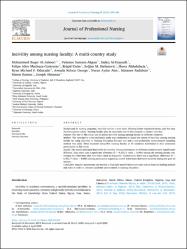| dc.contributor.author | Al-Jubouri, Mohammed Baqer | |
| dc.contributor.author | Samson-Akpan, Patience | |
| dc.contributor.author | Al-Fayyadh, Sadeq | |
| dc.contributor.author | Machuca-Contreras, Felipe Aliro | |
| dc.contributor.author | Unim, Brigid | |
| dc.contributor.author | Sefanovic, Srdjan M. | |
| dc.contributor.author | Alabdulaziz, Hawa | |
| dc.contributor.author | Oducado, Ryan Michael F. | |
| dc.contributor.author | George, Awoala Nelson | |
| dc.contributor.author | Aydın Ateş, Nuran | |
| dc.contributor.author | Radabutr, Matanee | |
| dc.contributor.author | Kamau, Simon | |
| dc.contributor.author | Almazan, Joseph | |
| dc.date.accessioned | 2021-06-03T09:53:19Z | |
| dc.date.available | 2021-06-03T09:53:19Z | |
| dc.date.issued | 2021 | en_US |
| dc.identifier.citation | Al-Jubouri, M. B., Samson-Akpan, P., Al-Fayyadh, S., Machuca-Contreras, F. A., Unim, B., Sefanovic, S. M. ... Almazan, J. (2021). Incivility among nursing faculty: A multi-country study. Journal of Professional Nursing, 37(2), 379-386. https://dx.doi.org/10.1016/j.profnurs.2020.04.002 | en_US |
| dc.identifier.issn | 8755-7223 | |
| dc.identifier.issn | 1532-8481 | |
| dc.identifier.uri | https://dx.doi.org/10.1016/j.profnurs.2020.04.002 | |
| dc.identifier.uri | https://hdl.handle.net/20.500.12511/7021 | |
| dc.description.abstract | Background: In nursing programs, incivility can be a main issue affecting future registered nurses, and this may threaten patient safety. Nursing faculty play an important role in this scenario to reduce incivility. Purpose: The aim of this study was to assess incivility among nursing faculty in different countries. Method: This descriptive (cross-sectional) study was conducted to assess the extent of incivility among nursing faculty by using Incivility in Nursing Education-Revised tool and a non-probability (convenience) sampling method was used. Three hundred ninety-five nursing faculty in 10 countries distributed in four continents participated in this study. Results: The results indicated that levels of incivility among participants in different countries were significantly different. Also, there was a significant difference (F = 9.313, P value = 0.000) among the nursing faculty concerning the behaviours that have been rated as disruptive. Furthermore, there was a significant difference (F = 6.392, P value = 0.000) among participants regarding uncivil behaviours that have occurred during the past 12 months. Conclusion: Regular assessments are needed to highlight uncivil behaviours and reduce them by making policies and rules in order to enhance academic achievement in nursing education. | en_US |
| dc.language.iso | eng | en_US |
| dc.publisher | W B Saunders Co-Elsevier Inc | en_US |
| dc.rights | info:eu-repo/semantics/embargoedAccess | en_US |
| dc.subject | Incivility | en_US |
| dc.subject | Nursing Faculty | en_US |
| dc.subject | Nursing Education | en_US |
| dc.title | Incivility among nursing faculty: A multi-country study | en_US |
| dc.type | article | en_US |
| dc.relation.ispartof | Journal of Professional Nursing | en_US |
| dc.department | İstanbul Medipol Üniversitesi, Sağlık Bilimleri Fakültesi, Hemşirelik Bölümü | en_US |
| dc.authorid | 0000-0003-0582-1484 | en_US |
| dc.identifier.volume | 37 | en_US |
| dc.identifier.issue | 2 | en_US |
| dc.identifier.startpage | 379 | en_US |
| dc.identifier.endpage | 386 | en_US |
| dc.relation.publicationcategory | Makale - Uluslararası Hakemli Dergi - Kurum Öğretim Elemanı | en_US |
| dc.identifier.doi | 10.1016/j.profnurs.2020.04.002 | en_US |
| dc.identifier.wosquality | Q2 | en_US |
| dc.identifier.scopusquality | Q1 | en_US |


















